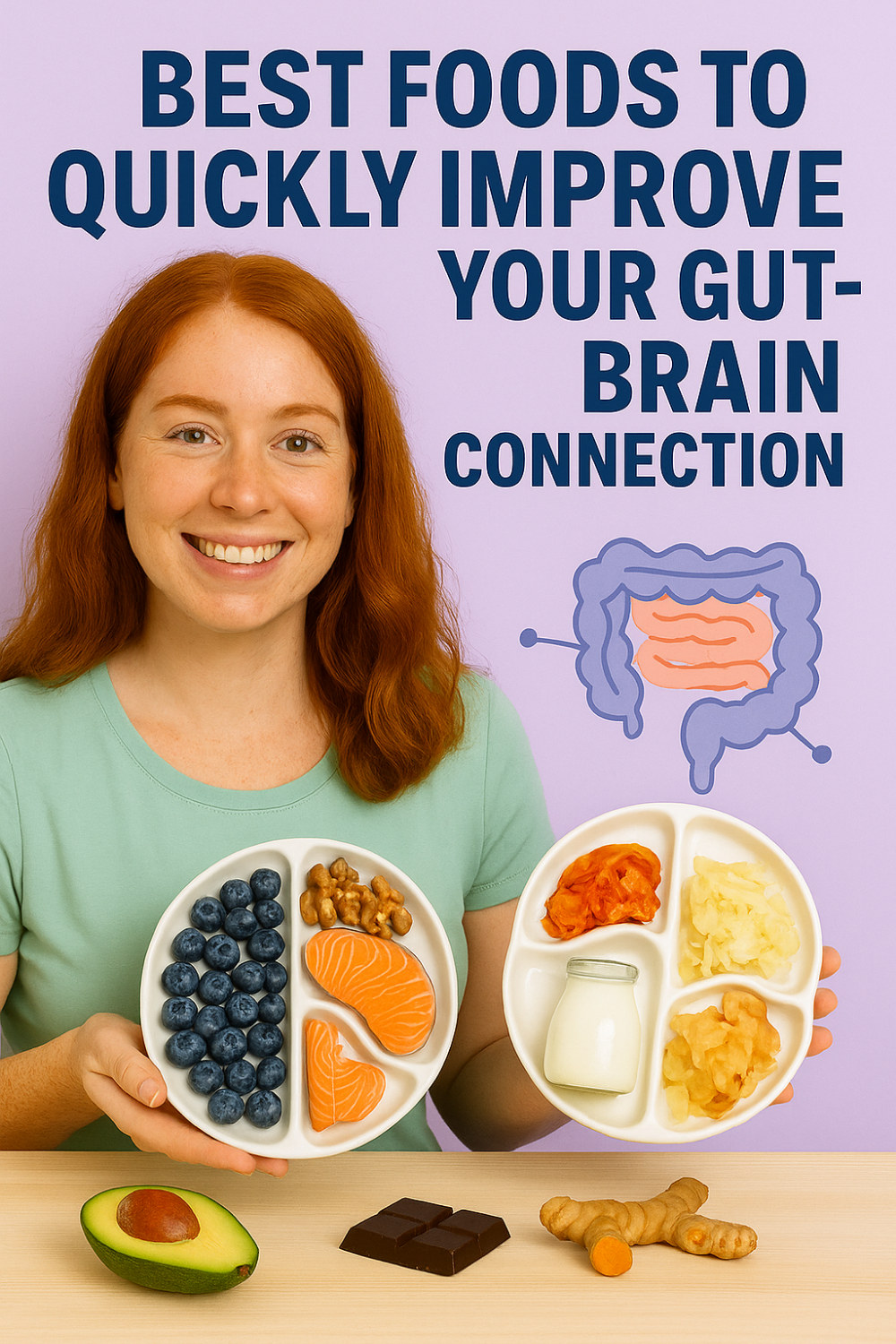The powerful connection between your gut and brain influences everything from digestion and immunity to mood, cognitive function, and stress management. Known as the “gut-brain axis,” this critical communication pathway is supported by the foods you eat. Choosing nutrient-rich foods scientifically proven to enhance gut health directly boosts your brain health, reducing stress, anxiety, and improving cognitive function. Discover key foods to include regularly in your diet to rapidly enhance your gut-brain connection.

- What Is the Gut-Brain Connection?
- How Food Influences the Gut-Brain Axis
- Probiotic-Rich Foods for Gut-Brain Health
- Fiber and Prebiotic Foods to Enhance Mood
- Omega-3 Fatty Acids to Support Brain Function
- Antioxidant-Rich Foods to Protect the Brain and Gut
- Foods Rich in Magnesium for Reduced Stress
- Fermented Foods to Boost Gut-Brain Communication
- Practical Meal Ideas for Gut-Brain Health
- Long-term Tips for Maintaining a Healthy Gut-Brain Axis
What Is the Gut-Brain Connection?
Your gut and brain constantly communicate through an extensive network called the gut-brain axis. This bidirectional communication occurs through nerves, hormones, immune cells, and the gut microbiota. A balanced, healthy gut microbiome significantly enhances brain function, mood, and stress resilience, while imbalances can lead to anxiety, depression, poor cognitive function, and digestive distress.
How Food Influences the Gut-Brain Axis
Diet is crucial for maintaining optimal gut-brain health. Specific nutrients directly support beneficial gut bacteria, reduce inflammation, protect neurons, and support neurotransmitter production (like serotonin and dopamine), enhancing mental clarity, mood, and cognitive performance.
Here are scientifically proven foods that effectively strengthen your gut-brain connection rapidly:
Probiotic-Rich Foods for Gut-Brain Health
Probiotics enhance beneficial gut bacteria, directly supporting neurotransmitter production and reducing inflammation that negatively impacts mood and cognitive health. Research in Frontiers in Psychiatry (2021) shows probiotics significantly improving mood, reducing anxiety, and supporting cognitive health quickly.
Best probiotic-rich foods:
- Yogurt with active cultures
- Kefir
- Sauerkraut
- Kimchi
Fiber and Prebiotic Foods to Enhance Mood
Prebiotics, dietary fibers that nourish probiotics, significantly influence brain health by enhancing gut microbiome diversity. A diverse microbiome produces more mood-regulating neurotransmitters and reduces inflammation. Research published in Nutrients (2020) confirmed fiber-rich diets quickly improve mood, reduce anxiety, and enhance cognitive function.
Top prebiotic-rich foods:
- Bananas
- Garlic and onions
- Oats and whole grains
- Asparagus
- Apples
Omega-3 Fatty Acids to Support Brain Function
Omega-3 fats, particularly EPA and DHA, rapidly improve brain function, mood stability, and cognitive performance. Omega-3 significantly reduces gut and systemic inflammation, positively influencing gut-brain communication. A 2020 study in Frontiers in Immunology found omega-3 fats significantly improving mood, cognition, and gut microbiome diversity.
Best omega-3-rich foods:
- Salmon, sardines, and mackerel
- Walnuts and chia seeds
- Flaxseeds
Antioxidant-Rich Foods to Protect the Brain and Gut
Antioxidants reduce oxidative stress and inflammation in the gut and brain, significantly enhancing gut-brain axis function. Regular consumption rapidly improves cognitive health and reduces mood disorders, as shown by research published in the Journal of Nutritional Biochemistry (2020).
Foods high in antioxidants:
- Berries (blueberries, strawberries)
- Leafy greens (spinach, kale)
- Green tea
- Dark chocolate
Foods Rich in Magnesium for Reduced Stress
Magnesium is essential for calming both your gut and brain, reducing stress hormones, and enhancing neurotransmitter balance. According to research in Nutrients (2021), magnesium-rich diets quickly lower stress levels, improve sleep quality, and reduce anxiety.
Magnesium-rich foods:
- Leafy greens
- Almonds and cashews
- Pumpkin seeds
- Avocados
Fermented Foods to Boost Gut-Brain Communication
Fermented foods contain beneficial probiotics and metabolites that enhance gut-brain signaling. Regularly consuming fermented foods quickly enhances mood, cognitive clarity, and stress resilience, confirmed by studies in the journal Cell (2021).
Best fermented foods:
- Yogurt and kefir
- Sauerkraut and kimchi
- Miso and tempeh
- Kombucha
Practical Meal Ideas for Gut-Brain Health
To effectively support your gut-brain connection, regularly incorporate these nutrient-rich meals:
Breakfast:
- Yogurt bowl with berries, walnuts, chia seeds
- Oatmeal with flaxseeds, bananas, cinnamon
- Kefir smoothie with spinach, avocado, berries
Lunch:
- Salmon salad with leafy greens, avocado, olive oil dressing
- Quinoa bowl with fermented veggies, chickpeas, avocado
- Whole-grain sandwich with turkey, spinach, mustard, pickles
Dinner:
- Grilled salmon, sautéed greens, sweet potato mash
- Chicken stir-fry with ginger, garlic, broccoli, brown rice
- Vegetable curry with turmeric, chickpeas, basmati rice
Snacks:
- Handful of nuts and dark chocolate
- Fresh berries and yogurt
- Apple slices with almond butter
Long-term Tips for Maintaining a Healthy Gut-Brain Axis
To sustain the benefits of improved gut-brain health, maintain these lifestyle habits consistently:
- Regularly consume gut-friendly, anti-inflammatory foods.
- Manage stress through mindfulness, meditation, or yoga.
- Stay physically active to enhance gut motility and brain health.
- Hydrate adequately to support overall digestive and cognitive health.
- Limit processed foods, sugar, and alcohol to prevent microbiome disruption.
Frequently Asked Questions
How quickly can diet improve the gut-brain connection?
Noticeable mood and cognitive improvements often occur within days to weeks of dietary changes supporting the gut-brain axis.
Can probiotics alone enhance mood and cognitive function?
Probiotics significantly help but combining with prebiotics and omega-3 fats enhances benefits rapidly and effectively.
Do fermented foods really improve mental health?
Yes, numerous studies confirm regular consumption rapidly enhances mood, cognition, and reduces stress.
Is omega-3 supplementation necessary for gut-brain health?
Supplementation helps if dietary intake of omega-3-rich foods is insufficient.
Can diet significantly reduce anxiety and depression symptoms?
Yes, studies consistently show dietary changes significantly alleviating anxiety and depression by enhancing gut-brain health.